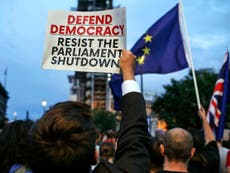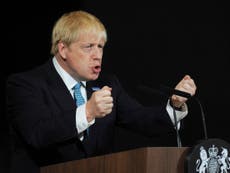Boris Johnson's contempt for our fragile constitution is the most dangerous thing to come of Brexit
The truth is that the British constitution is indeed under threat by Johnson, and it will wear the scars. That’s exactly how this fragile, flexible beast has always worked


Depending on who you listen to, Boris Johnson’s has either enacted a coup this week, or simply conducted some run-of-the-mill politics. The multi-coloured lens of Brexit has a habit of polarising the view.
Leavers like Johnson or his Chancellor Sajid Javid claim the prorogation of parliament is entirely normal before a new session. After an extraordinarily long two-year period, the time is ripe for a Queen’s Speech opening a new, post-Brexit parliamentary session.
Critics, they say, are simply Remoaners looking for any excuse to talk Britain down while crunch talks are held with the EU to avoid the no-deal outcome that anti-Brexit campaigners fear most. Claims by House of Commons Speaker John Bercow that suspending Parliament as ‘constitutionally outrage’ are presented as categorically untrue.
The divisive politics of 2019 can make it difficult to see which side is in the right, especially if you have some loyalty to any camp. The truth is that the British constitution is indeed under threat by Johnson, and it will wear the scars. That’s exactly how this fragile, flexible beast has always worked.
The warning for Boris is that it always operates best when underpinned by the consent of parliamentarians – and that’s precisely what is missing. Let’s look deeper.
The claim that proroguing happens is correct. This does happen all the time before new sessions of parliament. These moments all share a common thread: they last for only a matter of days, not weeks, and pause parliament without much, if any, surprise to open a new session.
Everything is different about this time. If the government simply wanted to start a new session, they could do so by proroguing for one day. Three or more weeks is entirely unnecessary to achieve that goal.
Moreover, suspending parliament was specifically ruled out only a few weeks ago by the prime minister and his chancellor. In June, Javid’s campaign team to see him elected Tory leader tweeted (since deleted) that “you don’t deliver democracy by trashing democracy”, explicitly rejecting shutting down parliament to achieve Brexit.
After winning the contest, a triumphant Johnson wrote to Tory members: “I would like to make it absolutely clear that I am not attracted to arcane procedures such as the prorogation of parliament. As someone who aspires to be the prime minister of a democratic nation, I believe in finding consensus in the House of Commons”.
Within weeks of taking high office, both Johnson and Javid have broken their promises and so, in their own words, have chosen “trashing” democracy while making it “absolutely clear” that they wish to preside over a less-than-democratic nation. Rarely have our most senior politicians either wilfully misled or U-turned so spectacularly on an issue of such fundamental constitutional importance.
Under the UK’s constitution, the different branches act in light of recognised conventions. One is that the Queen acts on the advice of her ministers, such as in Johnson’s request to suspend parliament. Her role should remain above partisan politics, and she probably had no option but to act on Johnson’s advice or risk entering a political dispute whatever her possible legal entitlement to do other than requested.
At present, the courts are hearing cases including one brought by Gina Miller with support from former prime minister John Major that seek to find Johnson’s request unlawful. Should they succeed, it would pour gasoline on the fire of constitutional outrage that Bercow and others see. This is because it would mean, on the request of her prime minister, the suspension of parliament by the Queen was unlawful and breached the constitution.
Of course, any self-respecting prime minister thought to have crossed such a constitutional line would resign in shame. However, shamelessness mixed with a contempt for parliament lie at the centre of this government.
Johnson’s Attorney General, Geoffrey Cox, has the notoriety of ensuring the previous Tory administration was found in contempt of parliament for refusing to publish his legal advice about Brexit. No government had ever been found in contempt before. Cox was then forced to do publish anyway.
Johnson not only kept him in post, but it is on Cox’s advice – will it be published? – that Johnson made his request to the Queen.
Johnson’s new chief of staff, Dominic Cummings, was found in contempt of parliament for refusing to answer select committee questions. Yet now he directs the political strategy and surely had some hand in the decision to suspend parliament.
A government with senior figures at ease with breaking long-held, almost sacred constitutional conventions for the mere sake of securing victory by any means necessary represent a direct attack on our democracy and the cherished freedoms we enjoy as part of this system. The UK’s constitution is under threat like never before in our lifetimes for the sake of playing a game of no-deal chicken with the EU that everybody outside 10 Downing Street can see for the farce it is.
The answer though, is not a written constitution which can be inflexible and unable to respond to new problems over time. Instead, our parliamentarians – in both the Commons and the Lords – have a duty to stand up and defend our constitution, especially when the government attempts to run roughshod over it. Their moment is next week.
“Take back control” was supposed to be about empowering parliament, not usurping it. Leavers and Remainers might disagree about Brexit, but they must unite around something more important – our constitution. These are difficult to create and foster, but much easier to decay and destroy.
If we do not act now, the long-term damage will be felt for many years to come and the worst consequence yet of the division made possible by the rush to Brexit before having any clear idea how to achieve it or what it would look like.
Thom Brooks is Dean of Durham Law School and a professor of law and government





Join our commenting forum
Join thought-provoking conversations, follow other Independent readers and see their replies